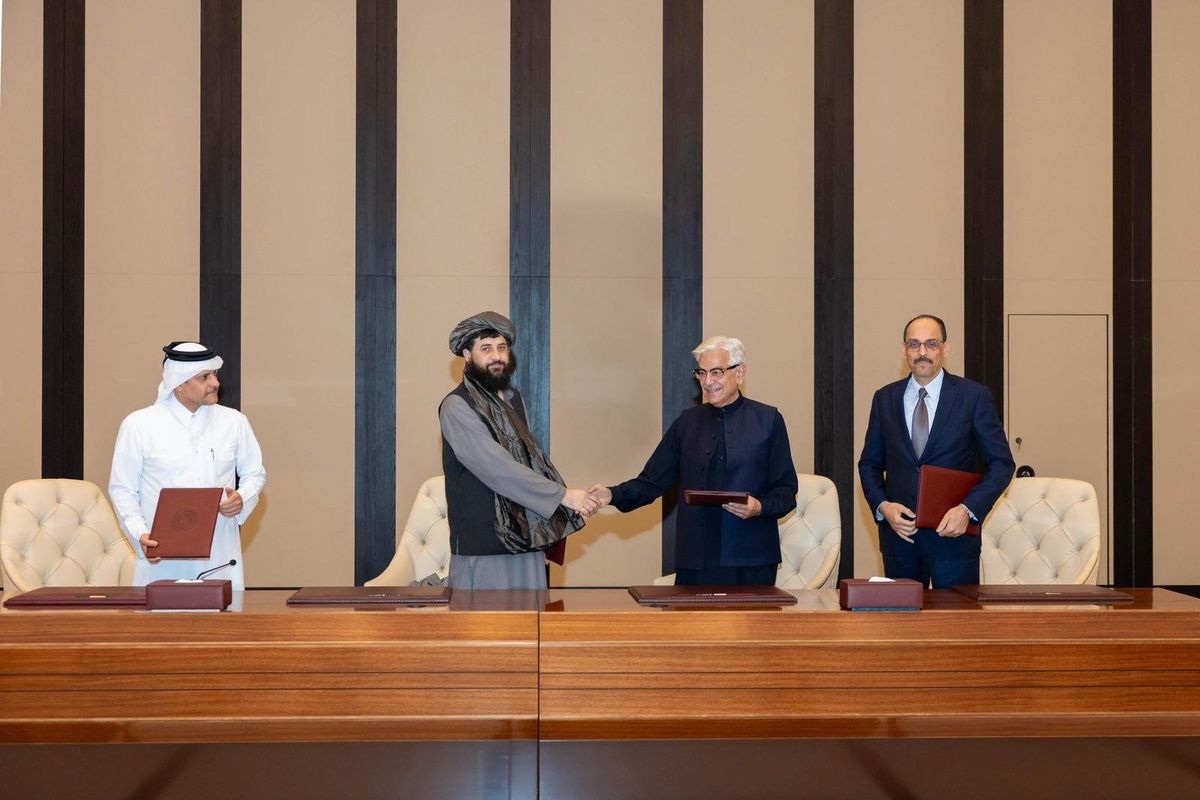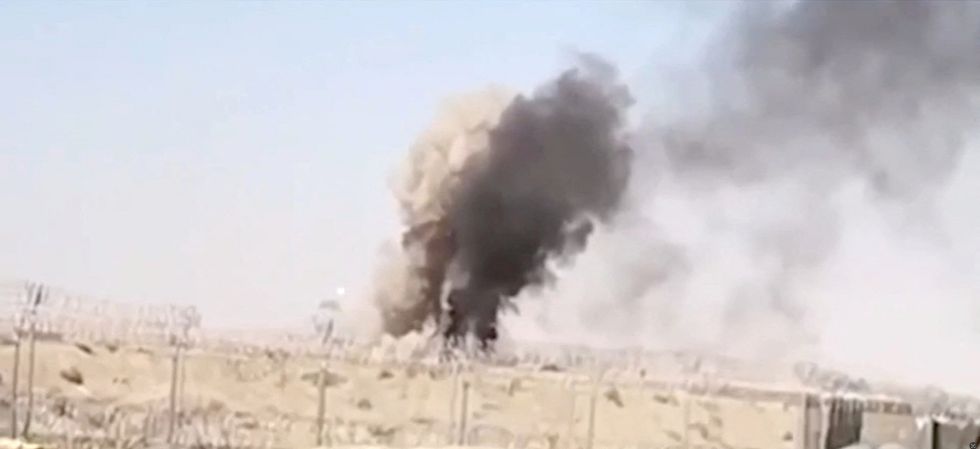Pakistan, Afghanistan agree to 'immediate ceasefire' in Qatar talks
Pakistan’s defense minister says attacks from Afghanistan 'will cease immediately' under the ceasefire deal
News Desk
The News Desk provides timely and factual coverage of national and international events, with an emphasis on accuracy and clarity.

Pakistan’s Defense Minister Khawaja Asif shakes hands with Afghan counterpart Mullah Yaqoob after finalizing a ceasefire agreement between the two countries in Doha, Qatar, on Oct. 18, 2025.
Courtesy: X/@MofaQatar_EN
Afghanistan and Pakistan agreed to an immediate ceasefire during talks in Doha after a week of fierce border clashes — the worst violence between the two neighbors since the Taliban seized power in Kabul in 2021.
Pakistan’s Defense Minister Khawaja Muhammad Asif announced on Sunday that the ceasefire “has been finalized,” adding that both sides will meet again on October 25 in Istanbul to discuss “detailed matters.”
پاکستان اور افغانستان کے مابین سیز فائر کا معاہدہ طے پاگیا۔ پاکستان کی سرزمین پہ افغانستان سے دھشت گردی کا سلسلہ فی الفور بند ھوگا۔ دونوں ھمسایہ ملک ایک دوسرے کی سرزمین کا احترام کریں گے الحمدوللہ
25اکتوبر کو استنبول میں دوبارہ وفود میں ملاقات ھو گی۔ اور تفصیلی معاملات بات ھوگی۔… pic.twitter.com/OKNbRuXEPU
— Khawaja M. Asif (@KhawajaMAsif) October 18, 2025
In a post on X, Asif wrote, “A ceasefire agreement has been finalized. The terrorist attacks from Afghanistan on Pakistan’s soil will cease immediately. Both neighboring countries will respect each other’s territory.” He thanked Qatar and Turkey for facilitating the negotiations.
Qatar’s Foreign Ministry confirmed that it mediated the talks along with Turkey. In a statement, it said both sides agreed to “an immediate ceasefire and the establishment of mechanisms to consolidate lasting peace and stability between the two countries.”
Statement | Pakistan and Afghanistan Agree to an Immediate Ceasefire During a Round of Negotiations in Doha#MOFAQatar pic.twitter.com/fPXvn6GaU6
— Ministry of Foreign Affairs - Qatar (@MofaQatar_EN) October 18, 2025
Follow-up meetings will be held “to ensure the sustainability of the ceasefire and verify its implementation in a reliable and sustainable manner,” the statement said.
The talks in Doha were led by Asif and his Afghan counterpart, Mullah Muhammad Yaqoob, and included Pakistan’s intelligence chief General Asim Malik, according to state television.
Deadly clashes
The negotiations followed a week of deadly clashes that killed dozens and wounded hundreds. Pakistan’s military had launched airstrikes across the 2,600-kilometer (1,600-mile) frontier after accusing Kabul of harboring militants from the Tehreek-e-Taliban Pakistan (TTP), who Islamabad says have stepped up attacks from sanctuaries in Afghanistan.
The Afghan Taliban denies those claims, accusing Pakistan of spreading misinformation and sheltering Islamic State-linked militants to destabilize Afghanistan — an accusation Islamabad rejects.
“Terrorism on Pakistani soil conducted from Afghanistan will immediately stop. Both neighboring countries will respect each other’s sovereignty,” Asif said.

On Friday, a suicide bombing near the border killed seven Pakistani soldiers and wounded 13, according to security officials.
“The Afghan regime must rein in the proxies who have sanctuaries in Afghanistan and are using Afghan soil to perpetrate heinous attacks inside Pakistan,” Pakistan’s Army chief, Field Marshal Asim Munir, said Saturday while addressing a graduation ceremony.
Afghan government spokesperson Zabihullah Mujahid said Pakistan conducted airstrikes inside Afghanistan hours after the ceasefire was extended Friday for the duration of the Doha talks. He said the attacks targeted civilians and warned that Kabul reserved the right to respond, though Afghan fighters were directed not to retaliate in order to respect the negotiations.
Pakistan’s Information Minister Attaullah Tarar denied the civilian casualty claims, saying on X that Pakistani forces struck “verified” militant camps along the border. He said more than 100 militants had been killed in recent operations, including those behind Friday’s suicide attack.
Security issues remain at the core of the dispute, with Pakistan accusing the Taliban of sheltering TTP militants. The cross-border violence flared on October 11, days after blasts rocked Kabul during a visit by Taliban Foreign Minister Amir Muttaqi to India.
The Taliban launched a deadly offensive along parts of its southern border with Pakistan, prompting Islamabad to respond militarily.
A senior Taliban official told AFP that Pakistan had bombed three locations in Afghanistan’s Paktika province Friday night, killing 10 civilians, including two children.
Local officials said the situation has since calmed but tension remains. “For now, the situation is returning to normal,” said Saadullah Torjan, a minister in Afghanistan’s Spin Boldak region. “But there is still a state of war and people are afraid.”
Relations between the two countries have remained strained since 2023, with Islamabad warning that TTP-led attacks from Afghan soil have worsened security in Pakistan’s Khyber Pakhtunkhwa and Balochistan provinces.
- With additional input from Reuters and AFP.










Comments
See what people are discussing